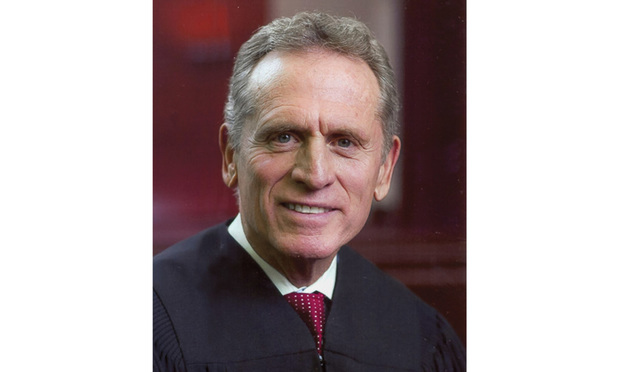Class Certified in Case Against Phone Provider for NJ Jails and Prisons
A suit claiming that the private company contracted to provide phone services at nearly every New Jersey correctional facility charges improperly inflated rates has been granted class action status.
August 07, 2018 at 04:01 PM
3 minute read
 U.S. District Senior Judge William Martini of the District of New Jersey.
U.S. District Senior Judge William Martini of the District of New Jersey.
A suit claiming that the private company contracted to provide phone services at nearly every New Jersey correctional facility charges improperly inflated rates has been granted class action status.
U.S. District Senior Judge William J. Martini of the District of New Jersey on Monday approved the plaintiffs' request for class certification in their case against Global Tel Link and its subsidiaries, lodged over claims that it overcharged for calls and tacked on superfluous fees.
The certification was granted on claims lodged under the unconscionability section of the Consumer Fraud Act and the takings clause of the Fifth Amendment.
The plaintiffs allege that GTL engaged in “unconscionable business practices by setting grossly excessive rates and fees,” Martini wrote in his opinion. Although pricing varied across facilities, the inmates claim that even the lowest rates and fees were “unconscionably high” in relation to the actual cost of providing inmate calling services.
The company provides services for 20 state Department of Corrections facilities and 21 county facilities—every such facility in the state, except for Passaic County's jail, according to the decision.
GTL, in opposing class certification, argued that in order for conduct to be unconscionable, an element of deception has to be involved.
Martini said: “The court agrees that if the CFA requires deception, then individual questions of fact likely predominate. On the other hand, if conduct can be 'unconscionable' without deception, and if unconscionability pertains to a single pattern or practice undertaken by GTL, then 'questions of law or fact common to class members' likely predominate over questions affecting individual class members. For reasons set forth in today's summary judgment opinion, the court finds that a defendant's business practice does not need to be deceptive in order to be 'unconscionable' under the CFA. Further, plaintiffs allege that even the lowest pricing schemes were unconscionably expensive. Plaintiffs therefore satisfy the commonality requirement.”
As for the takings clause count, the argument hinged on whether GTL was a “willful participant in a joint activity with the state or its agents” and if so, whether the state encouraged the company's alleged price-gouging.
“Although the counties may have selected different 'options' from GTL's [request for proposal], the essential business practice—and its causal relationship to the alleged harm sustained by plaintiffs—is common to all class members. Specifically, the government and GTL formed exclusive contracts under which GTL allegedly shifted the costs of higher site commissions to end users in the form of higher calling rates and ancillary fees,” Martini said.
The plaintiffs' attorney is James Cecchi of Carella, Byrne, Cecchi, Olstein, Brody & Agnello.
“We are pleased with the court's decision and look forward to presenting our clients' case at trial,” Cecchi said in an email.
Aaron Van Nostrand of Greenberg Traurig represents GTL. He did not respond to a request for comment.
This content has been archived. It is available through our partners, LexisNexis® and Bloomberg Law.
To view this content, please continue to their sites.
Not a Lexis Subscriber?
Subscribe Now
Not a Bloomberg Law Subscriber?
Subscribe Now
NOT FOR REPRINT
© 2025 ALM Global, LLC, All Rights Reserved. Request academic re-use from www.copyright.com. All other uses, submit a request to [email protected]. For more information visit Asset & Logo Licensing.
You Might Like
View All
AstraZeneca Files Flurry of Lawsuits to Protect Cancer Treatment Drug
3 minute read
In 2-1 Ruling, Court Clears Way for Decade-Old Wrongful Imprisonment Suit
5 minute read
Appellate Division Rejects Third Circuit Interpretation of NJ Law, Says No Arbitration for Insurance Fraud
4 minute read
Volkswagen Hit With Consumer Class Action Alleging Defective SUV Engines
3 minute readTrending Stories
- 1'It's Not Going to Be Pretty': PayPal, Capital One Face Novel Class Actions Over 'Poaching' Commissions Owed Influencers
- 211th Circuit Rejects Trump's Emergency Request as DOJ Prepares to Release Special Counsel's Final Report
- 3Supreme Court Takes Up Challenge to ACA Task Force
- 4'Tragedy of Unspeakable Proportions:' Could Edison, DWP, Face Lawsuits Over LA Wildfires?
- 5Meta Pulls Plug on DEI Programs
Who Got The Work
Michael G. Bongiorno, Andrew Scott Dulberg and Elizabeth E. Driscoll from Wilmer Cutler Pickering Hale and Dorr have stepped in to represent Symbotic Inc., an A.I.-enabled technology platform that focuses on increasing supply chain efficiency, and other defendants in a pending shareholder derivative lawsuit. The case, filed Oct. 2 in Massachusetts District Court by the Brown Law Firm on behalf of Stephen Austen, accuses certain officers and directors of misleading investors in regard to Symbotic's potential for margin growth by failing to disclose that the company was not equipped to timely deploy its systems or manage expenses through project delays. The case, assigned to U.S. District Judge Nathaniel M. Gorton, is 1:24-cv-12522, Austen v. Cohen et al.
Who Got The Work
Edmund Polubinski and Marie Killmond of Davis Polk & Wardwell have entered appearances for data platform software development company MongoDB and other defendants in a pending shareholder derivative lawsuit. The action, filed Oct. 7 in New York Southern District Court by the Brown Law Firm, accuses the company's directors and/or officers of falsely expressing confidence in the company’s restructuring of its sales incentive plan and downplaying the severity of decreases in its upfront commitments. The case is 1:24-cv-07594, Roy v. Ittycheria et al.
Who Got The Work
Amy O. Bruchs and Kurt F. Ellison of Michael Best & Friedrich have entered appearances for Epic Systems Corp. in a pending employment discrimination lawsuit. The suit was filed Sept. 7 in Wisconsin Western District Court by Levine Eisberner LLC and Siri & Glimstad on behalf of a project manager who claims that he was wrongfully terminated after applying for a religious exemption to the defendant's COVID-19 vaccine mandate. The case, assigned to U.S. Magistrate Judge Anita Marie Boor, is 3:24-cv-00630, Secker, Nathan v. Epic Systems Corporation.
Who Got The Work
David X. Sullivan, Thomas J. Finn and Gregory A. Hall from McCarter & English have entered appearances for Sunrun Installation Services in a pending civil rights lawsuit. The complaint was filed Sept. 4 in Connecticut District Court by attorney Robert M. Berke on behalf of former employee George Edward Steins, who was arrested and charged with employing an unregistered home improvement salesperson. The complaint alleges that had Sunrun informed the Connecticut Department of Consumer Protection that the plaintiff's employment had ended in 2017 and that he no longer held Sunrun's home improvement contractor license, he would not have been hit with charges, which were dismissed in May 2024. The case, assigned to U.S. District Judge Jeffrey A. Meyer, is 3:24-cv-01423, Steins v. Sunrun, Inc. et al.
Who Got The Work
Greenberg Traurig shareholder Joshua L. Raskin has entered an appearance for boohoo.com UK Ltd. in a pending patent infringement lawsuit. The suit, filed Sept. 3 in Texas Eastern District Court by Rozier Hardt McDonough on behalf of Alto Dynamics, asserts five patents related to an online shopping platform. The case, assigned to U.S. District Judge Rodney Gilstrap, is 2:24-cv-00719, Alto Dynamics, LLC v. boohoo.com UK Limited.
Featured Firms
Law Offices of Gary Martin Hays & Associates, P.C.
(470) 294-1674
Law Offices of Mark E. Salomone
(857) 444-6468
Smith & Hassler
(713) 739-1250






